Portsmouth mum defies the odds to survive – after family gathered to say their goodbyes when her life-support machine was turned off


Laura Lane, 38, had been told she had a chest infection but became so ill that her family had been summoned to say their last goodbyes before facing the difficult decision of turning off the life support system that was keeping her alive. But ‘one last shot’ using pioneering medical treatment meant she survived to be able to see her children grow up.
Laura’s ordeal began in February last year after developing what doctors believed at the time was a routine chest infection. What followed in the next week would leave her on the cusp of death.
Advertisement
Hide AdAdvertisement
Hide AdIt was on February 28 that Laura’s condition took a dramatic turn for the worse.
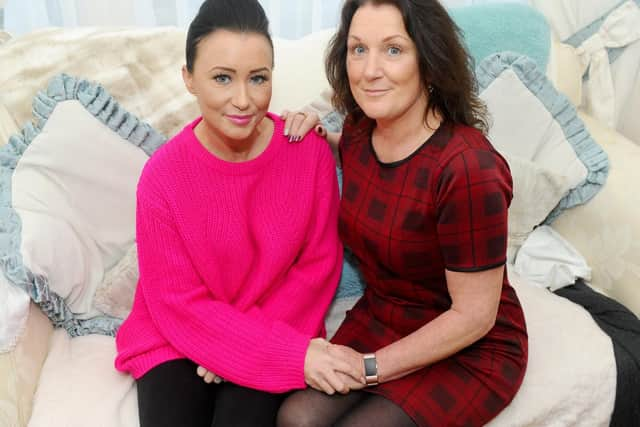

‘Doctors had told me it was a chest infection but I had felt really poorly and had not eaten for several days. I was at the top of the stairs when my legs just gave way and I collapsed,’ she explained.
Fortunately for Laura her son, Taylor Lane, who was 13 at the time, was unwell and off school.
‘After hearing my mum collapse I came out of my room to find her on the floor. I was shocked out how ill she looked,’ he said. ‘I managed to pull her onto the bed and phoned my grandmother who then called for an ambulance.’
Advertisement
Hide AdAdvertisement
Hide AdAt Queen Alexandra Hospital, Laura was diagnosed with double pneumonia and sepsis.
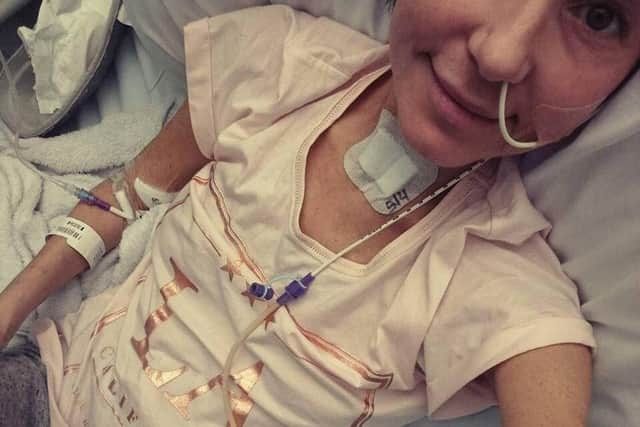

‘I had a collapsed lung and a bleed on the brain and the hospital put me into an induced coma,’ she said. ‘Over the next couple of days my condition deteriorated rapidly. My organs were failing and it was then I was put on life support.’
Told there was nothing more which could be done and faced with the heartbreaking decision to turn off the machines which were artificially prolonging Laura’s life, family members were gathering to say a tragic farewell to a much loved daughter, mother and niece.
‘The doctors told my mum that they couldn’t do anything else for me and I only had hours to live,’ said Laura. ‘The decision had been taken to turn off the life support system and my mother informed contact any family members to come and say goodbye.’
Advertisement
Hide AdAdvertisement
Hide AdLaura’s aunt, Melanie Lodge, said: ‘It was a really emotional period as my mother was also very unwell in the hospital at the time. Just when the family thought there was no hope, a consultant suggested their may be one last chance for Laura by transferring her to Guy’s and St Thomas’ Hospital in London where she could receive pioneering treatment. He said it was a “long shot” but at least we now had some hope.’
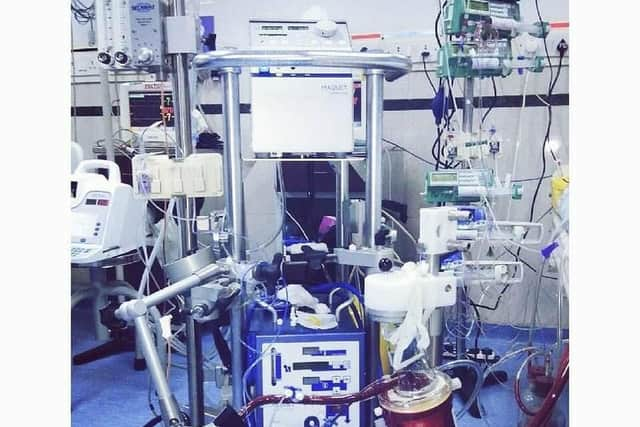

The first challenge for Laura was to survive the 60-mile journey to London.
‘The life support retrieval ambulance, which had been on route elsewhere, was redirected to pick up Laura because she was in such a bad way. She was not really expected to survive,’ explained Melanie.
Against the odds, Laura did survive the transfer and it was at Guy’s and St Thomas’ that she commenced the pioneering treatment which would ultimately save her life.
Advertisement
Hide AdAdvertisement
Hide Ad‘On arrival they put me on the ECMO (extracorporeal membrane oxygenation) machine. In order for them to fix my lungs the machine circulates blood out of my body to remove all of the toxins and carbon dioxide and pump oxygen into it. It acts like an artificial heart and lung. During the procedure, my family said they couldn’t see my chest moving as this natural process was being carried out by the machine,’ explained Laura.
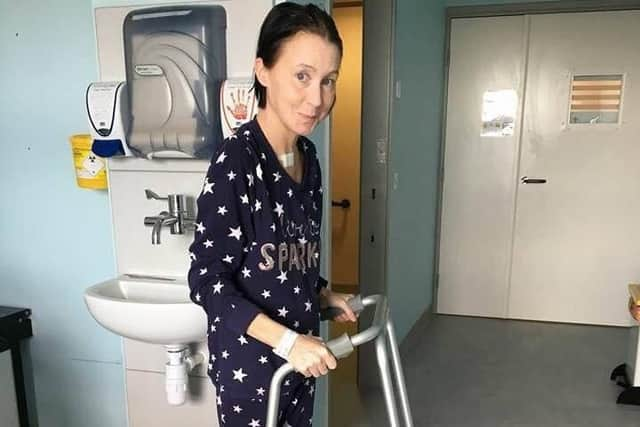

Laura remained on the treatment for 14 days before doctors took the decision on March 13 to take her off the machine and assess how her body had responded.
‘When I first came round I was delusional and didn’t know what had happened to me. I thought I had been kidnapped and was being used for scientific experimentation. I was temporarily paralysed and had had a tracheostomy and so was unable to talk. It was absolutely terrifying. It was only after a couple of days and having it explained by my family that I began to realise what had happened,’ explained Laura.
After regaining consciousness, Laura’s life remained in the balance as she embarked on the long road to recovery. Unable to eat, her weight had plummeted to just 35 kilos and initially she could only walk with the aid of a zimmer frame.
Advertisement
Hide AdAdvertisement
Hide Ad‘When my grandmother first saw me with the zimmer frame she didn’t recognise me – she thought I was a little old lady,’ said Laura.
‘I have had to learn to do everything again – walk, talk and even swallow,’ she added.
After being transferred back to Queen Alexandra, Laura remained in hospital until the end of April.
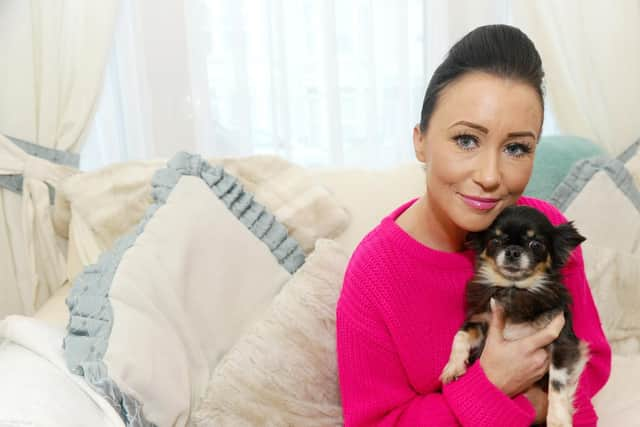

While still recovering Laura has now returned home to be with her two sons, Taylor and Callum, and pet dog Lily.
Advertisement
Hide AdAdvertisement
Hide Ad‘I still get really emotional when I talk about what happened. Without that machine and the treatment I received from Guy’s and St Thomas’ hospital then I wouldn’t be here today,’ explained Laura.
Melanie added: ‘Words cannot describe how grateful we are to the staff at the hospital for the treatment Laura received. I am just so grateful that my niece is still here.’
FUNDRAISING
After the life-saving treatment Laura received, both she and her family have pledged to raise money for the hospital’s Guy’s and St Thomas’ charity.
They are hoping to raise funds to help ensure the pioneering ECMO treatment which saved Laura’s life becomes more widely available.
Advertisement
Hide AdAdvertisement
Hide Ad‘If that machine hadn’t been available I would now be dead,’ said Laura.
The fact that machine saved my life and has the potential to save other people’s lives is amazing,’ she added.
Originally designed for use in babies and infants there are only five ECMO treatment centres for adults available in England.
An additional barrier to the universal provision of the machine is the high cost of treatment with the average expense for a patient in England costing £45,000.
Advertisement
Hide AdAdvertisement
Hide AdMelanie said: ‘We are so passionate about the hospital and raising money towards helping with providing ECMO treatment for others who may need it.’
Whilst Melanie and Laura would ultimately like to see an ECMO machine installed at Queen Alexandra Hospital, their first aim is to raise sufficient funds to train specialist ECMO nurses at Guy’s and St Thomas’. The training of each nurse costs around £900.
Melanie has organised a gig featuring the Rolling Stones tribute band, The Phoney Stones, which will take place at Fareham Fire Station on March 16.
‘The band are playing free of charge and have also donated T-shirts for us to sell. There will be a raffle, bar and auction, with Alan Knight having donated a signed football to the cause. I hope to raise at least £2000 to train an additional two nurses,’ explained Melanie.
Advertisement
Hide AdAdvertisement
Hide AdOnce Laura has recovered further she hopes to join in with the fund raising by taking part in this year’s Great South Run.
‘My friend ran in last year’s event and raised £1000 for the charity. I would love to take part this year and raise money for the hospital which saved my life,’ added Laura.
Son, Taylor Lane, 14, added: ‘I am so grateful that my mum was able to get this treatment and the machine was able to keep her alive. It is really important to raise money so that we can have more machines and nurses.’
Whilst all 100 tickets for the gig have now been sold, anyone who would like to donate items to be raffled or auctioned are asked to contact Melanie at [email protected].